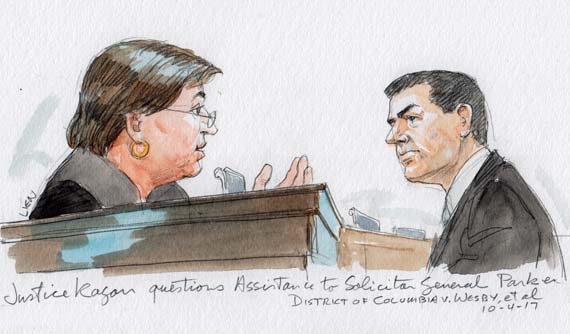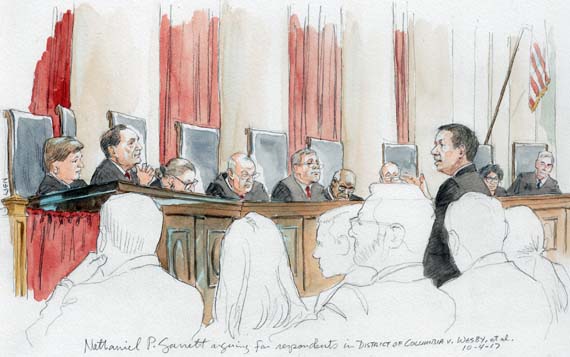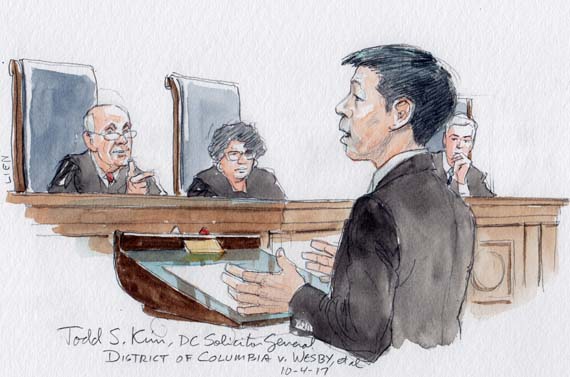Argument analysis: The justices get personal in probable-cause argument


When the justices took the bench this morning to hear oral argument in District of Columbia v. Wesby, there were two young children, dressed in their Sunday best, seated in the front row of the public section. The issues before the court in Wesby seemed like fairly dry ones: whether D.C. police officers had probable cause to arrest a group of people attending a party in a vacant home; and, even if they did not, whether the lawsuit must be thrown out anyway because the officers are entitled to immunity. But the kids wound up getting an earful, as the justices spent most of the argument focusing on the facts of the (as even Nathaniel Garrett, who represented the partygoers, acknowledged) “raucous party” – which included “stripping, drinking, and marijuana smoking.” The children (and the rest of the courtroom) also got a peek into Justice Elena Kagan’s younger years, as she admitted that she may have once attended large parties where she didn’t know the host and other guests “may” have been smoking marijuana. The tea leaves were not entirely clear by the end of the hour, but it seems likely that the police officers will eventually prevail, at the very least on the ground that they are entitled to immunity.

We often think of the Supreme Court as deciding lofty issues of law. But today they were mostly mired in the facts, trying to figure out whether the officers had probable cause to arrest the partygoers, many of whom claimed that they had been invited to the party by someone named “Peaches” or “Tasty.” Arguing on behalf of the District of Columbia and the police officers, D.C. Solicitor General Todd Kim urged the justices to remember that the standard for probable cause “accounts for the practical limitations that officers face when” arresting someone, including “an inability to look into the minds of suspects offering innocent explanations for suspicious conduct.” From the officers’ common-sense perspective, he stressed, there was a “fair probability” that the partygoers were trespassing when all of the facts of the situation were viewed together: The homeowner told police that no one was supposed to be there; it looked as though no one was living there, the partygoers said that they didn’t know where “Peaches” was, and they fled when the police arrived.
But the court’s four more liberal justices saw things differently. Justice Sonia Sotomayor asked Kim why the partygoers didn’t have a right to be there. I don’t ask to look at a lease when I am invited to someone’s house, or otherwise make sure that my host has a right to be there, she told him.

Justice Stephen Breyer echoed Sotomayor’s thoughts, noting that – at least for young people today – it’s common for someone to tell others that there is a “party at Joe’s. And before you know it, 50 people go to Joe’s house” – none of whom asks whether it is actually Joe’s house or whether they are allowed to be there. Why is this different, Breyer queried? He later added that, in his view, there’s no reason for police to believe that the partygoer would know that it isn’t Joe’s house.
Arguing for the United States in support of the city and the police officers, Assistant to the Solicitor General Robert Parker also told the justices that police officers should be able to draw inferences from the “entire constellation of facts,” without having to “peer into the head of” a suspect. He emphasized that the United States was not arguing that someone can be arrested merely because he accepted a secondhand invitation to a party without first checking to make sure that the host’s name was on the lease. But in a scenario like this one, in which the partygoers found themselves in a “compromising situation,” he suggested, the “deck is stacked” against them.
Breyer was again unconvinced. Are you saying, he asked Parker, that every time the police go to a party in a sparsely furnished house and the partygoers claim that they were invited, the police can arrest them? Parker insisted that the government was not asking for a bright-line rule, but then Justice Ruth Bader Ginsburg chimed in. “Peaches,” Ginsburg said, had said that she had just leased the house, in which case it would make sense that she didn’t have much furniture.

Parker seemed to agree, but added that there was more to consider here: The house was in a state of “disarray.” Sotomayor (who apparently also has attended more interesting parties than I have) retorted that “disarray” is “what happens during a party.” Parker pushed back, telling the justices that the house wasn’t just in “disarray” but “very dirty,” with trash and “used contraceptives” “strewn about.” (Fortunately, one of the children was asleep by then.)
That’s when Kagan joined the fray, telling Parker that he was meeting resistance because the scene might have looked very different from the partygoers’ perspective. After recalling her own party-going days, Kagan suggested that the partygoers in a case like this one might not have known all the details. Instead, she posited, “they just know that Joe is having a party” – perhaps with some liquor or “recreational drugs” – “and they’re having a good time.”
Representing the partygoers, attorney Nathaniel Garrett tried to capitalize on the earlier line of questioning, telling the justices that even if there was a “raucous party” going on at the house, that didn’t mean that the partygoers should have known that they weren’t supposed to be there. But he didn’t get far before Chief Justice John Roberts interrupted him, reminding him that there was more going on than just a wild party.
Although he had previously seemed to side with the partygoers, Breyer also pressed Garrett, telling him to put himself in the officers’ shoes. The officers knew that the house was supposed to be vacant, it looked “sort of vacant,” and they knew that parties in vacant houses had been a problem in the neighborhood. All of that information, taken together, Breyer suggested, “leads them to think, well, these people knew it was a vacant house.” And if a “reasonable officer” would “have concluded that the partygoers knew” that the house was vacant, “that’s enough,” Breyer said.
At that point, the argument moved temporarily to a technical discussion of D.C. trespass law and what it means for a house to be “vacant” from a legal standpoint, but Justice Samuel Alito sought to sidestep the technicalities. When neighbors phoned the police to complain about the party in the vacant house, Alito asked rhetorically, did they mean “vacant” under D.C. law or instead simply that no one was living there? Garrett agreed that it was the latter.
The argument then took an interesting socioeconomic turn, as Alito asked Garrett whether police would have probable cause to arrest partygoers if a party that was otherwise identical to the one at the heart of this case instead took place in an affluent suburb of Washington. Garrett responded that it would be a “closer” case than this one, suggesting that the officers could consider the condition of the house, which might look different than in a less affluent neighborhood.
That answer didn’t sit well with Justice Neil Gorsuch, who a few minutes later asked Garrett whether officers should “really have to distinguish between parts of town in deciding whether to make an arrest.” Joining Kagan in giving us a glimpse into his own life, Gorsuch rejected any suggestion that residents in a more affluent part of town would have better furniture than their counterparts in a poorer neighborhood, so that police officers might have probable cause to arrest in the more affluent neighborhood. Gorsuch told Garrett: “We all live with folding chairs for a time when we move.”
Returning to this topic during Kim’s rebuttal, Sotomayor’s comments were more pointed, but perhaps no less personal. She told Kim that, even if she did not “completely” agree with Garrett that “the wealth of the neighborhood should make a difference,” she suspected that “if police officers arrived at a wealthy home and it was white teenagers” who told police that they had been invited to the party, “I doubt very much those kids would be arrested.” “Twenty-one people en masse arrested for going to a party,” she observed to Kim. “Does that feel right?”
Although most of the argument focused on whether the police should have arrested the partygoers, there was another topic lurking in the background that could prove pivotal: Even if the police lacked probable cause to make the arrests, can they be sued for it? Kim maintained that they cannot. He told the justices that the discussion today about probable cause, along with the dissent from four judges on the U.S. Court of Appeals for the D.C. Circuit who believed that there was indeed probable cause, “would be enough to establish that this constitutional question was not beyond the debate,” which would entitle the officers to qualified immunity.
Ginsburg asked Garrett to weigh in, reminding him that the officers could be held liable only if they either “knowingly violated the law” or were “plainly incompetent.” Garrett responded that they were “plainly incompetent,” because there was nothing to suggest to them that the partygoers knew that they weren’t supposed to be in the house.
Kagan was not necessarily persuaded. She pointed out that several cases from the local federal trial court had upheld convictions for trespass even though the defendants had offered excuses for their presence on the property. In the face of cases like those, she asked, what are police officers supposed to do?
At the end of the hour, it was hard to make any predictions with any degree of certainty: The justices who asked questions seemed divided on the probable-cause question, but Justice Anthony Kennedy did not tip his hand. (Kennedy asked only one question, but it may have been the best line of the day. Following up on a series of questions about whether some partygoers thought the celebration was either a bachelor party or a birthday party, Kennedy quipped: “So Peaches” – a woman – “is the host at a bachelor party?”) But, particularly given the concerns that Breyer voiced in the second half of the argument, it’s hard to imagine that the partygoers can get five justices to agree that the arrests were not only wrong, but so wrong that they can meet the high bar needed to overcome the officers’ immunity. A decision is expected by the end of June.
This post was originally published at Howe on the Court.
Posted in Merits Cases
Cases: District of Columbia v. Wesby